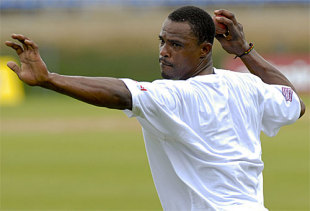Runako Morton

|
|||
|
Related Links
Players/Officials:
Runako Morton
Teams:
West Indies
|
|||
MORTON, RUNAKO SHAKUR, was killed in a car accident on March 4. He was driving home from a club match at the Queen's Park Oval when his car hit a telegraph pole on the Solomon Hochoy Highway in central Trinidad. He was 33.
Morton was originally from Nevis, which has defied its minuscule size and population (around 12,000) to produce six Test players. His promise was recognised as early as 1996, when he was picked for the regional Under-19 team in three matches against their Pakistani counterparts in the Caribbean. A strong and aggressive batsman, if predominantly bottom-handed, he became one of the leading scorers for the Leeward Islands, amassing 4,104 runs at an average of 44 with 11 hundreds, among them successive innings of 210 against Barbados and 231 against the Combined Campuses & Colleges in 2009.
A volatile temperament that repeatedly led him into trouble, allied to technical defects, limited Morton's success at the highest level. Yet, as several of his team-mates attested, his love of the game could not be queried. The first of his widely publicised run-ins with authority led to his expulsion from the West Indian board's initial Academy in 2001. A year later, he left the Champions Trophy early after claiming his grandmother had died.
She turned out to be hale and hearty, which - compounded by further indiscretions on an A-team tour - brought him a year-long ban. There were later clashes with the law: a year before his death he and fellow Nevisian Tonito Willett were charged by the T&T police with possession of marijuana, an accusation to which they pleaded not guilty. Friends reported that marriage to a Trinidadian woman, and bringing up their three children, had been a calming influence. After moving to Port-of-Spain, Morton piled up the runs for Queen's Park, Trinidad's oldest and most famous club, where he was a popular mentor to young players; chosen for T&T for what turned out to be his final season in 2011, he became one of the few to represent two territories in the regional first-class tournament.
The first of two strikes by senior players opened the way to his Test debut in Sri Lanka in 2005. Like many of the first-timers, he was embarrassed by the mesmerising spin of Muttiah Muralitharan and the swing of Chaminda Vaas. Still, Morton's breathtaking catching in the slips moved Ian Chappell, commentating on the series, to rate him the best in the position at the time. In 15 Tests up to 2008, going in mostly at No. 3 or 4, Morton averaged just 22. The closest he came to a hundred was at Napier in 2005-06; unbeaten on 70, he was denied by rain. His 67, against Australia at Sabina Park in 2007-08 in a fourth-wicket partnership of 128 with Shivnarine Chanderpaul, was probably his best innings - but the next Test was his last.
Morton was more at home in one-day internationals, in which he averaged 33 despite being shuffled around the order: he was tried in every position from opener to No. 7. He scored centuries against New Zealand and Zimbabwe, although more representative of his belligerence and grit was an unbeaten 90 in Mumbai, in a victory over Australia that helped West Indies to the 2006 Champions Trophy final. Still, the contrasts which made Morton such an enigma had been typified only a few weeks earlier by an innings in a one-day international in Kuala Lumpur - also against Australia, he made a 31-ball duck, a record.
In his eulogy at a service in Trinidad which preceded the burial in Nevis, Brian Lara described Morton as "a fighter [who] worked harder than most, a true team man". And Chris Gayle, Lara's successor as captain, tweeted: "We lost a true warrior… heart of a lion. As captain at the time, I wish I had ten Mortons to lead on a cricket field!"

